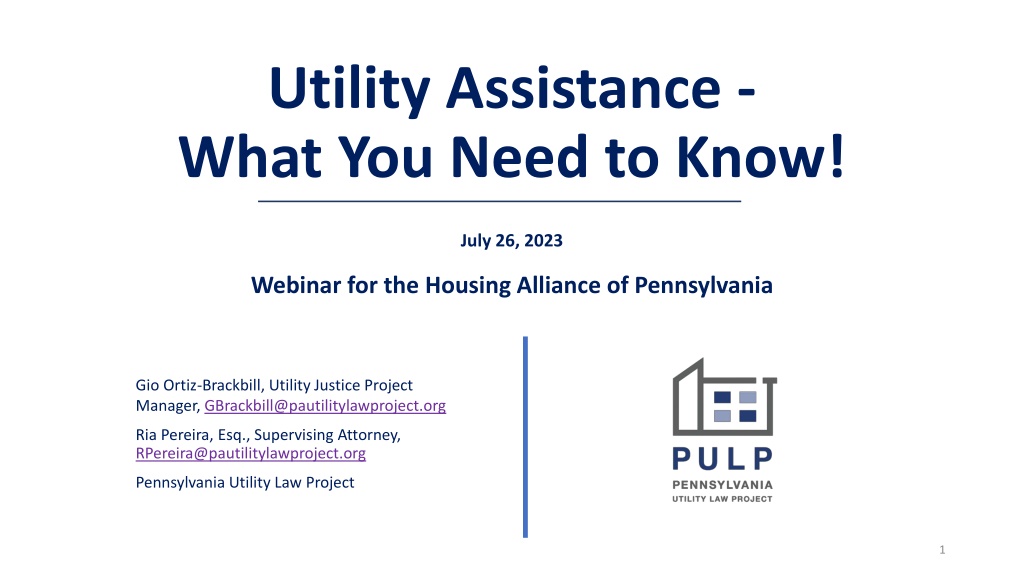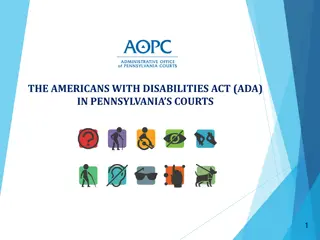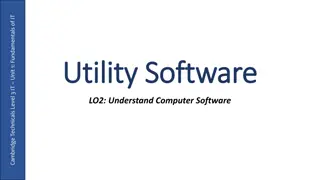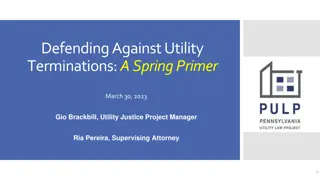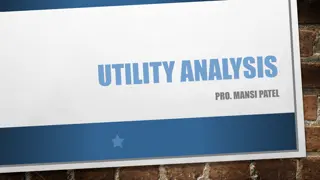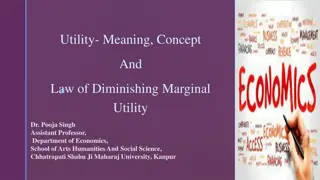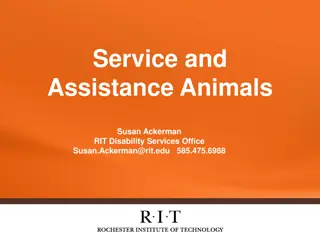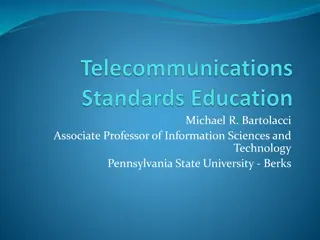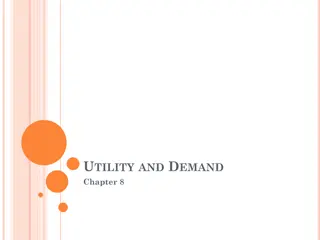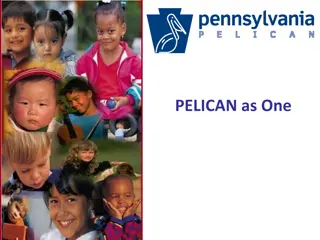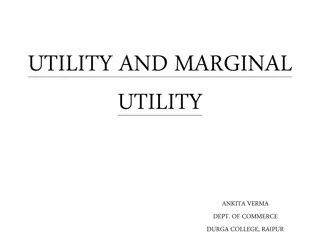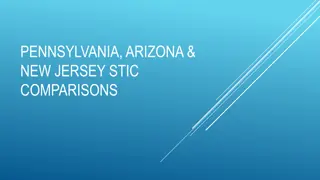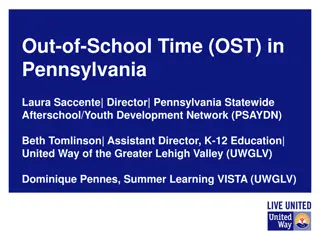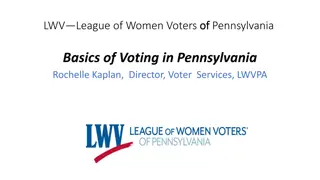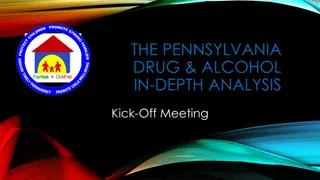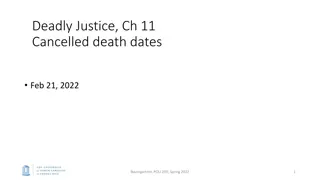Understanding Utility Assistance and Support in Pennsylvania
Gain insights into utility assistance initiatives in Pennsylvania through the perspective of the Pennsylvania Utility Law Project. Topics covered include regulated vs. unregulated utilities, affordability issues, tenant protections, and the impact of utility insecurity on various aspects of life. Discover how these programs aim to provide equitable access to safe and affordable utility services for individuals facing economic challenges and learn about resources available for support.
Download Presentation

Please find below an Image/Link to download the presentation.
The content on the website is provided AS IS for your information and personal use only. It may not be sold, licensed, or shared on other websites without obtaining consent from the author. Download presentation by click this link. If you encounter any issues during the download, it is possible that the publisher has removed the file from their server.
E N D
Presentation Transcript
Utility Assistance - What You Need to Know! July 26, 2023 Webinar for the Housing Alliance of Pennsylvania Gio Ortiz-Brackbill, Utility Justice Project Manager, GBrackbill@pautilitylawproject.org Ria Pereira, Esq., Supervising Attorney, RPereira@pautilitylawproject.org Pennsylvania Utility Law Project 1
Pennsylvania Utility Law Project PULP is a statewide legal services project of Regional Housing Legal Services and is a member of the Pennsylvania Legal Aid Network. PULP s mission is to secure just and equitable access to safe and affordable utility services for Pennsylvanians experiencing poverty. We work to achieve our mission by empowering individuals and communities through: Legal Representation, Groups, and Individuals Education and Training Policy Advocacy Supportive Services Consultation 2
Agenda Regulated vs. Unregulated Utilities Utility Affordability Preventing Termination Connecting / Reconnecting Service Tenant Protections PUC Dispute Process Resources/Referrals 3
Utility Insecurity Is Intersectional Health Exposure to unsafe temperatures Inability to clean and sanitize self and home Lack of access to clean drinking water Housing Constructive eviction Self-Help Catalyst for eviction, foreclosure, and homelessness Difficulty relocating to new housing Ineligibility for public or private housing Family Interrupts family unity, children may be removed from home Contributes to economic abuse and control Hinders child learning and development Finance Liens (municipal utilities) encumber property Harms credit report Food spoilage, burst pipes Utility moratoria nationwide reduced COVID-19 infection rates by 4.4% and reduced mortality rates by 7.4%. Source: Duke University, NBER, Working Paper 4
Regulated Utilities Unregulated Utilities Most large electric, natural gas, and water companies Subject to jurisdiction of the Pennsylvania Public Utility Commission Municipal utilities & Electric Co- Ops (except PGW & PWSA) Consumer complaints filed with Court of Common Pleas Regulated vs. Unregulated Utilities Must follow Water Services Act, Utility Services Tenants Rights Act, and other broad consumer laws Consumer complaints can be filed with the PUC Must follow rules/regulations for billing, collections, and terminations No standard billing, collection, and termination standards Electric and gas utilities must offer assistance programs with specific components No requirement to offer assistance programs or payment arrangements 6
Federal Poverty Level 2023 2 person household 4 person household 50% FPL $9,860 $15,000 100% FPL $19,720 $30,000 150% FPL $29,580 $45,000 200% FPL $39,440 $60,000 2022 2 person household 4 person household 50% FPL $9,155 $13,875 100% FPL $18,310 $27,750 150% FPL $27,465 $41,625 200% FPL $36,620 $55,450 7
Customer Assistance Programs (CAPs) Available to customers of large, regulated gas and electric companies. Some regulated water companies (Aqua, Pa. American, PWSA, and PWD) offer assistance programs as well. Customer Assistance Programs (CAPs) Benefits: Reduced rates / lower monthly payments. Past debt (arrearage) frozen. Arrearage forgiveness earned over time. Eligibility Requirements: Annual gross household income is at or below 150% FPL. Periodic income verification. *May ask for Social Security #, but it is not required 8
Low Income Usage Reduction Program (LIURP) Low Income Usage Reduction Program (LIURP) Benefits Energy audit Appropriate energy conservation measures High efficiency refrigerators/heating system upgrades / appliances Insulation / weatherization LEDs/power strips/etc. Low Income Usage Reduction Program (LIURP) Eligibility Income at or below 150% or 200% FPL (depending on utility) High usage Landlord approval *CAP Customers may be required to participate in LIURP
Hardship Fund Programs Benefit Cash grant, typically up to $500 to resolve crisis Eligibility and program terms vary by utility Typical terms include: 200% FPL or below Recent payments / Attempts to make payments *utility may make exceptions, but you have to ask! Temporary hardship Grant must resolve the problem Hardship Funds 10
CARES The program is targeted to customers who: Are having trouble paying their bill, and Have short term problems that are causing the inability to pay. Offers several types of services: Referrals to social service agencies, Budget counseling, and Special arrangements for bill payment. CARES Advocacy Tip: CARES is a little-used program, and the utility has wide discretion to resolve the customer issue. 11
Benefits: $9.25 monthly subsidy for telephone, broadband, or bundled service.** Subsidy cannot pay for equipment, but some providers offer free phone. Benefit is portable to other providers. Lifeline One subsidy per household (defined as an economic unit). Eligibility: Income at or below 135% FPL, or categorical eligibility. SNAP, Medicaid, SSI, Public Housing, or Veteran Pension/Survivor Benefits https://www.usac.org/lifeline/ 12
Benefits: Up to $30 / month broadband subsidy. Some providers: $100 device discount, with $10-$50 co-payment. Eligibility: Households with incomes at or below 200% FPL; Households enrolled in SNAP, Medicaid, Federal Public Housing Assistance, SSI, WIC, or Lifeline; Households participating in certain Tribal programs; Households that include a member who is approved to receive free or reduced-price school lunch or breakfast; Pell Grant recipient; A person who participates in an internet provider s low-income program. https://www.fcc.gov/acp Affordable Connectivity Program (ACP) 13
Eligibility 150% FPL Water / wastewater responsibility Behind on bill / risk of termination / service off Utility agrees to maintain service for minimum 90 days after grant received Did not previously receive a grant for the same provider and same service. Low Income Household Water Assistance Program (LIHWAP) Benefits Up to $2,500 for water, AND Up to $2,500 for wastewater *Reopened for limited time with very limited funding will close on Aug. 11 or when funding runs out! 14
15 Program Basics Administered through DHS. November through April Gas, Electric, and Deliverable Fuel May be used for water if required for heating Ex: steam heat radiators Types of Assistance: Cash Grant (Available Every Year) Crisis Grant (Imminent Heating Emergency must resolve crisis) Crisis/Interface Weatherization (furnace repair/replacement) LIHEAP Crisis Cooling Pilot Program*** Apply at County Assistance Office (CAO) or through COMPASS. https://www.compass.state.pa.us/ For furnace repair / replacement - Apply at CAO, but local WAP agency will perform the work with oversight from DCED. Low Income Home Energy Assistance Program (LIHEAP)
16 Funded by Dep t of Energy (DOE), administered by Dep t of Community and Economic Development (DCED) Eligibility: 200% FPL Priority for elderly, individuals with a disability, families with children, and high energy users. Pennsylvania Resident Landlord permission (if renter) Slowly expanding to multifamily buildings, too! Health and Safety Deferrals: The WAP Deferral Program is designed to help resolve health and safety issues to install measures in the home. Whole Home Repairs*** Weatherization Assistance Program
Connecting / Reconnecting Service 17
No Security Deposit for CAP-Eligible Households Not required to actually enroll in CAP to waive security deposit, but may be required to provide proof of income. 4-Year Rule Arrears which are more than 4 years cannot be required to be paid as a condition to providing service. Connecting / Reconnecting Service Protections for Customers with PFA or Other Court Order 52 Pa. Code 56.323 Additional Notice for Customers with PFA / Court Order Attempted personal contact immediately preceding termination. If no personal contact, notice is posted at the property and termination is delayed for 48 hours. 18
Terminations may only occur Monday Thursday No Friday Terminations Occur because of nonpayment of undisputed delinquent account. Failure to: comply with terms of payment agreement. complete security deposit. permit access to equipment. Termination Rules Notice Requirements Written Notice Personal Contact Affirmative Consent for Electronic Notice Last Knock Rule 20
Utility Issued PAR PUC Issued PAR 66 Pa. C.S. 1405 Current customers (including within 30 days of service term) <150% FPL = 5 year payback timeframe The PUC cannot require a utility to enter into a second payment arrangement absent extraordinary circumstances. 66 Pa. C.S. 1407 Applicants for service (those who have been without service for 30 days or longer) trying to reconnect at same address Reconnection fee (cost-based) < 150% FPL = 24 months An agreement whereby a customer who admits liability for billed service is permitted to amortize or pay the unpaid balance of the account in one or more payments. Do not admit liability unless you know what you owe! Do not agree to a payment arrangement that you cannot afford to pay. Payment Arrangements Utilities have discretion to offer as many payment arrangements as they want for any length of time. 21
Medical Certificates A household may obtain a medical certificate to stop termination if a household member has a serious illness ORa medical condition which requires utility service to treat their illness. Examples: asthma requires air conditioning in summer / diabetes requires refrigeration for medication). A medical professional not the utility gets to decide which conditions qualify. Medical Certificates A medical certificate stops termination for 30 days. A customer may submit a new certificate every 30 days if they pay all current charges by the due date. A customer may renew medical certificates two times (90 days of protection) even if they do not pay current charges by due date. 22
Pennsylvania has parallel statutes permitting continued service: Discontinuance of Service to Leased Premises Utility Service Tenants Rights Act USTRA Also known as Subchapter B Tenant Protections 68 P.S. 399.1-.18 66 Pa. C.S. 1521-33 Applicable to unregulated utilities, including municipal utilities Applicable to utilities that are under the jurisdiction of the PUC. 24
A tenants rights under USTRA & DSLPA arise when: A utility company makes the decision to terminate utility service to leased premises due to nonpayment by the landlord ratepayer. 66 Pa. C.S. 1523; 68 P.S. 399.3. USTRA/DSLPA also apply when landlord seeks to voluntarily discontinue service. The following must ordinarily be true: The landlord is the utility s named customer. USTRA: Does not matter whether lease says it is the tenant s responsibility. DSLPA: Landlord must be responsible for service under terms of lease. Both: No requirement to produce written lease. The tenant took possession while utility service was active. The proposed termination of service is due to nonpayment or voluntary requests (as opposed to unsafe conditions, need for repairs, meter tampering, etc.). Tenant Protections 25
If a utility is in the landlords name, and the landlord does not pay, a renter must be: Notified of the landlord s arrearages 30 days in advance of termination. Given an opportunity to pay the last 30 day bill Allowed to pay utility bills going forward and deduct from rent, without taking on the debt of the landlord Protection from retaliation Tenant s Right to Notice and Continued Service A landlord/owner may not voluntarily shut off service while occupied by a tenant without notarized consent or in emergencies. Tenant must be given notice and ability to keep service on going forward. 26
Right to Deduct Payments from Rent Owed Affected tenants who have made payments to a utility on account of nonpayment by the landlord have the right to deduct these payments from rent owed. Retaliation by Landlord Prohibited Landlords prohibited from retaliation against affected tenants who exercise rights. Additional Tenant Protections Protection from Constructive Eviction Protections apply when a landlord ratepayer voluntarily requests that the utility terminate service to rental units. Waiver Prohibited Both USTRA and DSLPA expressly provide that a waiver of tenants rights are void and unenforceable. 27
Foreign Load If a tenant s electric meter is powering a shared / common area, the landlord is responsible for the FULL BILL for that residence until she/he removes the load from the shared / common area. Protection from retaliation (eviction defense / attorneys fees) if landlord seeks to evict because tenant exercised protections against foreign load. The tenant is only responsible for the utility bills going forward, after the foreign load issue is resolved. Any prior debt transferred to LLD will not transfer back to tenant. Applies to regulated water, electric, and natural gas utilities Foreign Load 28
Initiate Dispute with Utility Utility has the obligation to address disputes. Customer has the obligation to give utility a chance to resolve a dispute before going to the PUC. 52 Pa. Code 56.140 et seq. Informal Complaint PUC Bureau of Consumer Services (BCS) 1-800-692-7380 Filing an informal complaint will temporarily stop termination, if filed before the day of termination. Formal Complaint Administrative hearing before ALJ Appeals go to Commonwealth Court PUC Complaints Note: Must be licensed attorney to represent client before PUC, but advocates/paralegals can refer a client to file pro se and provide information about rights. 30
Contact Information: Thank you! Gio Ortiz-Brackbill: (484) 282-4447, GBrackbill@pautilitylawproject.org Ria Pereira: (407) 922-5172 RPereira@pautilitylawproject.org 32
